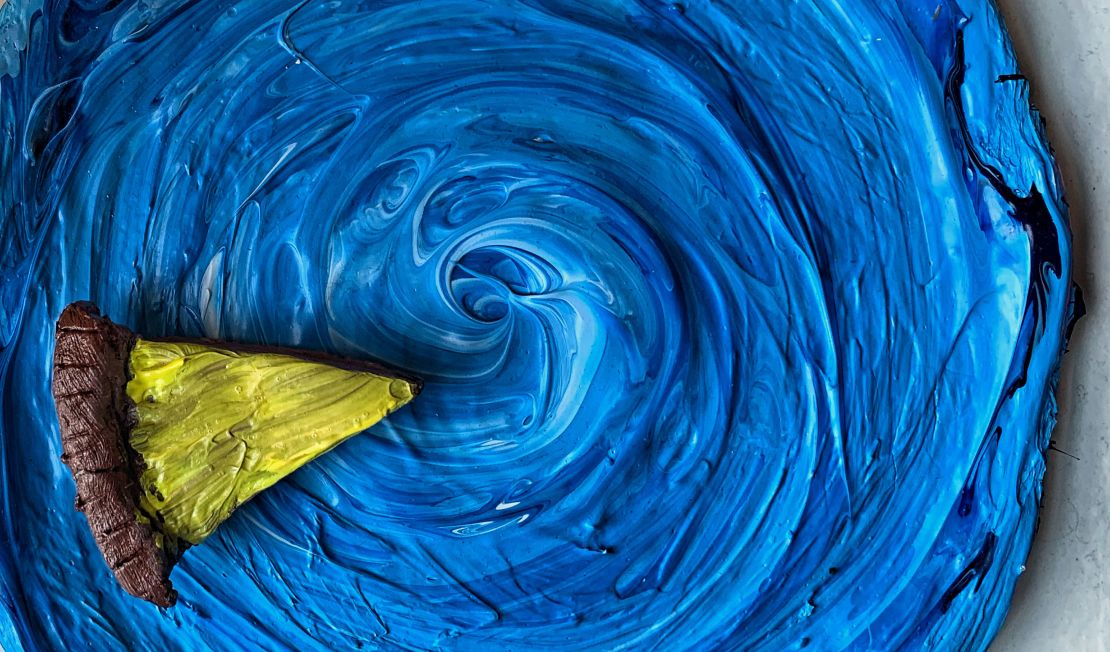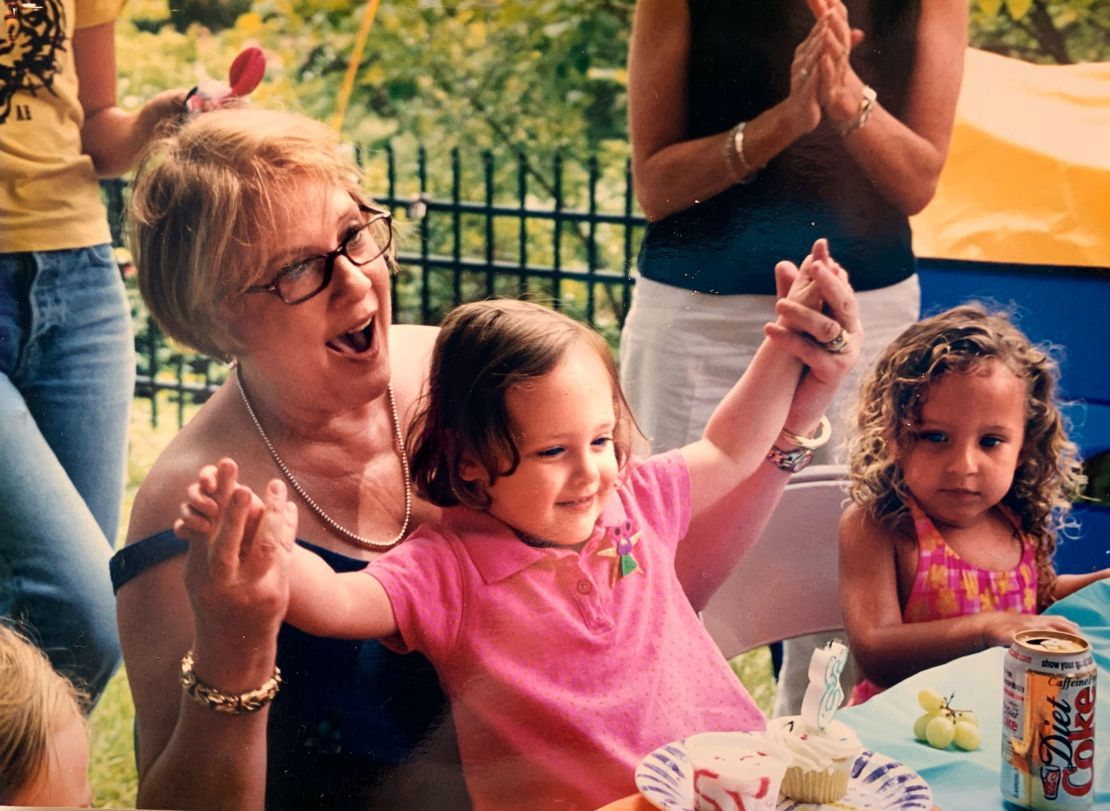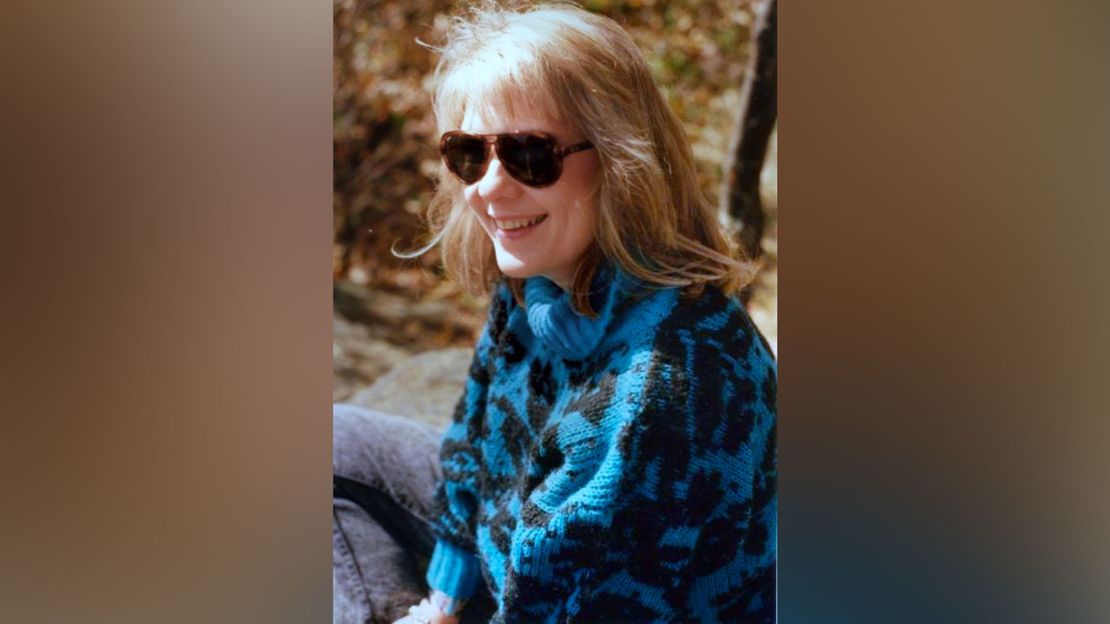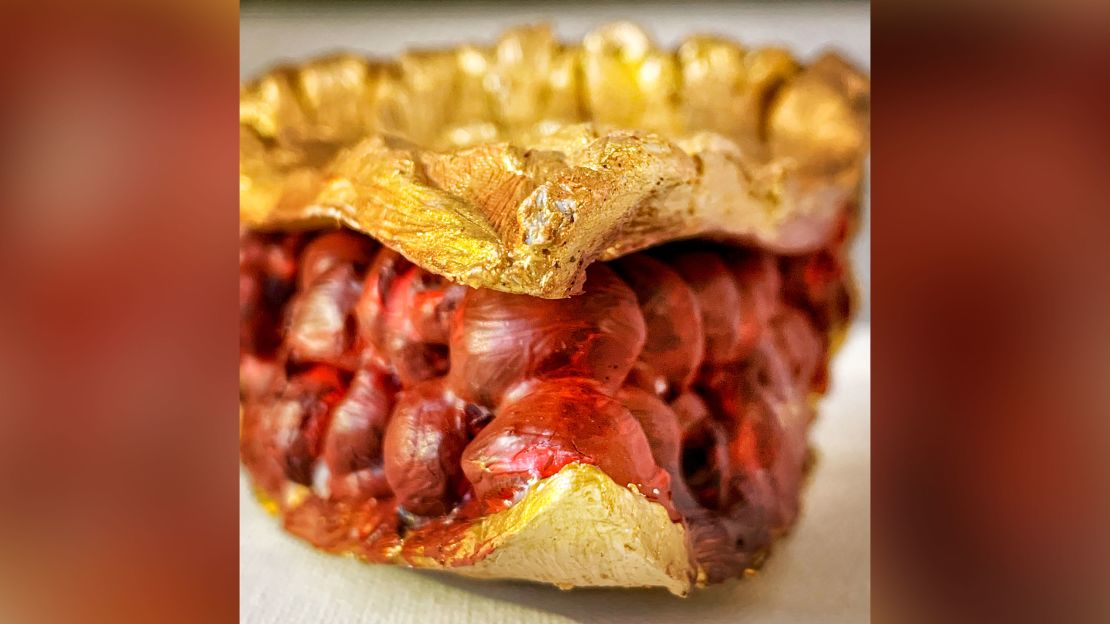Editor’s Note: John Bare is a photographer, songwriter and author who has worked for more than two decades in the nonprofit sector. His novel, “Fair-Skinned Brunette With the Porcelain Shine,” will be available in January from Wisdom House Books. John shares his house with rescue dogs Winston and Isadora. The views expressed in this commentary are his own. View more opinion at CNN.
My wife, Betsy, died in September from Covid-19.
A big part of me died with her.
Millions of families around the world are suffering from the same, sudden loss. I am part of this tribe, a new global community of survivors trying to find order in chaos, grinding through the emptiness this virus has created. With every sunrise, we count the minutes ticking off through the day, wondering if we can hold it together through Zoom meetings at work and well-intended queries about how we are doing.

Caught in darkness, I have turned to pie to light my journey. I’m not eating pie. At least no more than usual. I use pie the way a student of meditation uses a mantra. To practice mindfulness. To soften sharp edges of the day. I carve pie slices from clay. I paint images of pies in acrylic. I photograph pie. I work on song lyrics about pie. I imagine writing murder mysteries where the plot turns on pie. I question the particulars of pie, wondering about the forces that shaped pie over the past thousand years. If pie could talk!
Pie makes people smile. Betsy’s favorite was German chocolate pie from the local K&W Cafeteria. She’d frequently request a slice, with a scoop of vanilla ice cream. I would bring home a whole pie. Who buys one slice of pie? Coconut pie and chocolate icebox pie were back-ups.
Betsy found joy in food. In her last year, as pain increased from chronic diseases, she requested cake and ice cream each day. When store-bought cake would not do, we retrieved a chocolate pound cake from the local bakery. On special occasions, she’d order a hummingbird cake or Lady Baltimore cake.
Betsy loved biscuits, too. With illness limiting our travel options, we aspired to annual holiday retreats to Chapel Hill, NC — a two-hour car ride away. Her favorite breakfast there was a bacon, egg and cheese biscuit and cinnamon roll from Sunrise Biscuit Kitchen. She would nibble at both, not finishing either.

Early on with Betsy, I learned not to reserve joy for special occasions. Turns out deprivation does not lead to salvation. It just leads to a hankering for pie.
Betsy and I tested positive for the coronavirus at the same time in August. Our best guess is she contracted it at a local medical center – while waiting in a line for a Covid-19 test a pulmonologist required for her annual exam. Between tests administered during hospitalizations and doctor visits, Betsy had cleared four or five Covid-19 tests before the positive result.
For me, the illness was nasty. Loss of taste, cognitive disorientation, low-grade fevers and a level of exhaustion I did not know was achievable.
For Betsy, who suffered from what we call “underlying conditions,” the diagnosis arrived at the same time as a blood infection. For the first week, doctors described her coronavirus case as mild. By day eight, they described it as deadly. The virus grabbed her lungs and never let go.
The terms “underlying conditions” and “chronic disease,” brought into public conversation by the pandemic, mask details we avoid. When we say our loved one is suffering from cancer, asthma, diabetes and kidney disease – which were all on Betsy’s list – it makes people wince. So, we hold our tongues and nod as acquaintances suggest certain fixes – from yoga to Pilates to forest bathing. Spousal caregivers become expert at helping partners suffering from chronic disease create an illusion that all is well. Now the ferocity of Covid-19 is tearing down this fa?ade.
A spouse waiting in the car is one of the tells of chronic disease. When I would stop at a country store near Davidson on the pretense of buying organic eggs and artisan cheese, Betsy would put in her order and wait. The first things in my basket were ginger cookies and fried pies. Betsy would unwrap a fried pie and eat it on the drive home.
Now, I cry in the car. And I cry in the grocery store, at work, on the phone, in my doctor’s office. I have cried writing, painting, sculpting, sending emails and pruning shrubs. I have cried in North Carolina, South Carolina, Georgia, Massachusetts and Montana. I am aggregating votes in the Electoral College of Crying.

The crying is more complicated than anyone knows. Grief is a source, surely. More often, the tears emerge when I recall how lucky Betsy and I were to write our own ending, more or less. I cry out of guilt when my fortunes turn positive. I cry because I don’t know how to order dinner now that I’ve lost my dining companion.
I cry because I understand Roger Angell’s commentary on aging, published in The New Yorker in 2014 when he was in his early 90s: “Everyone in the world wants to be with someone else tonight, together in the dark, with the sweet warmth of a hip or a foot or a bare expanse of shoulder within reach. Those of us who have lost that, whatever our age, never lose the longing: just look at our faces.”
I have not cried at the hospital because I was not allowed to see Betsy there. Managing Betsy’s hospitalization by phone, one thing I learned is you never want to pick up a call and hear from palliative care. It signals the patient has slipped into a situation where life-or-death decisions are approaching.

Betsy’s nurses, who delivered updates by phone, were as encouraging as the angels. Their kindness props up hope, even when conditions are not so great. After a few days, the hospitalist described her illness as “mild.” Yet “mild” was still miserable for Betsy. The breathing supports hurt her face. Sleep was hard to come by. Her back pain flared. Out of caution, and worried about the need for emergency intubation, the hospital required a liquid diet. Betsy craved her own pizza creation – thin crust, white sauce, pineapple and mushroom. She craved a Mr. Goodbar.
The hospitalist was so optimistic that he sent Betsy home to recover. I was still under quarantine and recovering from Covid-19 myself, so we were frightened by the burden of my having take on the role filled by the medical professionals who had been caring for Betsy around the clock.
When health workers lifted Betsy into the hospital bed we had rented for home use, we realized the doctor had not made provisions to supply the Covid patient’s essential need: home oxygen. A nurse from the hospital called to check on Betsy, part of the “virtual” care the hospital provided to Covid-19 patients recovering at home. The nurse shrieked when I reported her oxygen level. “She needs to be in the hospital,” the nurse said.

In all, Betsy’s home stay lasted about one hour. The emergency medics arrived not long after the call from the virtual-care nurse. They loaded Betsy back into an apparatus to move her down a flight of stairs and into the ambulance. That was the last time I ever saw her.
Turns out returning to the hospital is not like checking back into a hotel, even when the hospital recalls the patient. The patient starts over in the ER. Brand new to a system already bloated with broken bodies. Betsy was left alone another night. No company, no solid food. In case an emergency surgery was required, as she described the experience to me later, she had to have an empty stomach.
She was one of many bodies parked on one of many beds alongside the acute-care workstream somewhere in the warren of bays and hallways. When I called the next morning expecting to hear that the hospital had resolved the home-oxygen glitch, I was told she was in critical condition. Just like that. From our master bedroom to ICU, with conditions unfavorable.
A few days later the palliative care lady called. Her candor was brutal. Betsy was trying to breathe. The docs were providing support, short of the ventilator. The support, I was told by the palliative care lady, was not working. The family had to make a decision.
Imagine every breath as a new project. Each breath a heavy lift, requiring specific intent and effort. For days and days, Betsy worked to suck in air and to push out air. Every breath took more from her than it gave. For Betsy and millions of Covid-19 patients, breathing is no longer an involuntary act. Over and over again, lying motionless in that hospital bed without a friend in sight, all of life’s comforts stripped away. Stuck in whatever position the nurses have arranged their bodies, they focus all of their mental and physical energy on one thing: Breathing.
“I’m trying,” Betsy would tell me in our calls. “I’m trying really hard.”
Only a couple of us close to Betsy know that, pre-Covid, on bad asthma days she struggled to pull enough air to read aloud to her granddaughters. How could I tell her that she was failing, that her full-out effort to breathe was not good enough, even with the contraptions that helped push and pull oxygen?
Betsy had made it clear to doctors and family that she did not want to be moved to the ventilator. In the end, she decided to try the ventilator, on limited terms, to see if an experimental treatment of antibodies would reverse her fortunes.
In my private call with the palliative care lady, I asked about what would happen if Betsy tried the ventilator. If the ventilator failed, I wanted to know, would Betsy wake up for a final conversation before passing?
No, I was told. If the ventilator failed, Betsy would pass without regaining consciousness.
It was a Monday, just after lunch, when I was able to connect to Betsy by phone. Just Betsy and me. No docs or family members. Soon a nurse came in and said the medical team was ready to move Betsy to the ventilator. We knew that was coming but didn’t know when. Now the cold hard truth from the palliative care lady was no longer hanging out there in the future.
We, of course, spoke of the chance of a miraculous recovery, of the excitement over the experimental antibodies treatment. We also acknowledged that, absent the miracle, this would be the last time we would ever speak to each another.
You can watch this play out in the movies. You can imagine what you might say. In truth, there is no way to simulate the intensity. We both said to each other what we wanted to say. We were not rushed. The medical team would wait.
I count this among the luckiest moments of my life. To have had this time together, for us each to say what we wanted to say, for us each to hear what the other said, was an incredible gift. Then there was nothing else to say. It was time. As we started to cut the phone connection, I could hear the medical team moving medical machines, readying Betsy for the intubation.
The palliative care lady was right. Betsy never woke up. Her condition never reversed. Covid-19 took her.
During the night and early mornings, in the state between asleep and awake, Betsy and I still talk. In our bed, I reach over and rub her arm. I wake up stroking a pillow. I am grateful for these encounters. They are sweet. Never bitter. On the shelves by her side of the bed, I have placed my first ceramics works, the clay carved and painted in the form of a slice of sour cherry pie. There is a secret compartment inside. Betsy liked secret compartments. I am grateful Betsy still visits me. I know that will pass one day, and it makes me sad to imagine it so. I have Betsy’s voice preserved on a couple of phone messages, asking me to call her at the hospital. That wasn’t intentional. Just that death comes on so fast. Only after the graveside service do you examine answering machines.
Stay up to date on the latest opinion, analysis and conversations through social media. Join us at Facebook/CNNOpinion and follow us @CNNOpinion on Twitter. We welcome your ideas and comments.
With grief sweeping over me in waves that come without notice, my psychologist says I should seek out things that bring comfort. My first response: Not feeling like this would bring comfort! But I have to trust the journey. There is no switch to flip. All of this is self-indulgent, and that nags at me.
People lose loved ones every day. Death is the only guarantee. Tragedy is thick in the air. Refugees, migrant children separated from their parents, the uninsured sick who cannot get care. Who am I to ask for grace? I am blessed in so many ways. Our two rescue dogs, the companions that prolonged Betsy’s life by filling days with wagging tails and kisses, now rush to lick my face. A friend in London gave birth to a girl the weekend Betsy passed, gifting me the circle of life. In the sweep of history, we are on this planet for a fraction of a fraction of any measurable unit of time.
All of this reflection makes me wonder about pie, which for more than a thousand years has brought comfort to humans. We all seek our larger purpose. We thrive when we can be a part of something bigger than ourselves, something that unifies us. For the moment, I shall be part of pie.




